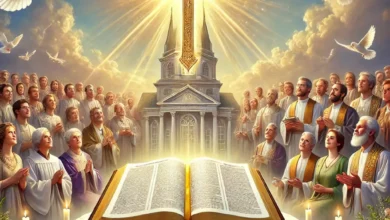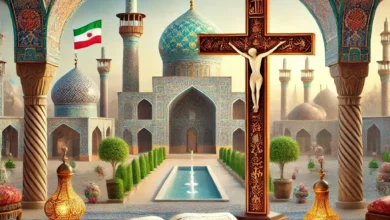
Who are the sons of God referred to in the Book of Genesis?
Who Are the Sons of God in the Book of Genesis? Genesis Chapter Six reminds us that striving for a destiny separate from God is futile.
The Nephilim are not the only mysterious figures in Genesis Chapter Six. They may not even be the most mysterious. The identity of the “Sons of God” is, in many ways, more important for a precise understanding of what happened in Genesis Chapter Six. Even after identifying the Sons of God, it is necessary to examine the relationship between the Sons of God and the Nephilim. We will explore both topics below.
فرست محتوا
Who are the Sons of God?
There are three main options, plus a combination of the first two, for identifying them, including:
- Sons of God as the descendants of Seth: The Sons of God are human descendants of Seth who are indifferent in their choice of a spouse.
- Sons of God as human rulers: The Sons of God are human rulers or “divine” kings representing God who are indifferent in their choice of a spouse.
- Sons of God as non-human beings: The Sons of God are non-human beings (such as angels) who marry human women.
- Sons of God as men from Seth’s lineage who act as divine rulers on earth, representing God.
Each of these views recognizes a form of boundary-crossing in the marriage between these Sons and human daughters. The idea is that the Sons of God, whoever they may be, make a judgment that crosses an unspoken boundary, which varies slightly depending on their identity.
So, which interpretation is more likely? To answer this question, we must consider (a) the phrase “Sons of God” and some related terms, (b) some close parallels from the ancient Near East, and (c) make a decision (an informed guess) about which boundary seems to have been crossed in this context.
Where are the Sons of God mentioned in the Bible?
First, I should note that the following is not a complete examination of all related phrases. There is good evidence that “Sons of God” could also refer to human rulers, based on variations of the term “Sons of God” (e.g., “Son of God” in the singular, “gods,” or “Sons of the Most High” in Psalms 82:2-4, etc.).
Second, the exact phrase “Sons of God” is not frequently used in the Hebrew Bible. Probably the most famous are Job 1:6 and 2:1, where the “Sons of God” present themselves before the Lord in something resembling a divine council. The use of “Sons of God” in Job clearly refers to non-human beings. In both verses, it is mentioned that “Satan” (a rough translation of the Hebrew word “Hasatan,” a combination of the definite article “ha” and the noun “satan”) came with the “Sons of God.” This suggests they might be angels.
Probably more relevant for interpreting the Genesis text is Deuteronomy 32:8; however, a textual variation in 32:8 makes using this passage more challenging. The variation includes:
- Masoretic Text (Hebrew text): “… He fixed the boundaries of the peoples according to the number of the Sons of Israel.”
- Septuagint (Greek translation of the Hebrew Bible): “… He fixed the boundaries of the nations according to the number of the angels of God.”
- Dead Sea Scrolls: “… He fixed the boundaries of the peoples according to their number.”
While I think reading “Sons of God” is probably original, reading “Sons of Israel” complicates using Deuteronomy 32:8 to interpret “Sons of God” in Genesis 6:4. Overall, limiting the textual evidence to the exact phrase “Sons of God” suggests that the “Sons” were non-human/semi-divine beings, especially if Deuteronomy 32:8 is translated as “Sons of God” or “Angels of God” instead of “Sons of Israel.”
Read more : According to the Bible, when did Christianity begin?
What conclusion can we reach about the Sons of God?
Concluding that the “Sons of God” refers to semi-divine beings raises several interesting questions. We will address two of them. First, why should humans be held responsible for the actions of the “Sons of God”? This question assumes that (a) verse three includes divine action against the “taking” described in verses 1 and 2 and (b) verses 1 to 8 form a single introduction to the flood narrative.
Part of the answer to this first question requires understanding the verb “take” in the context of marital agreements. While we might think the “Sons of God” forcibly and indiscriminately “take” women, the Hebrew verb is usually used in the context of marital agreement (Genesis 4:19; 11:29; 12:19; 20:2, 3; 25:1). The scene involves a negotiated union between the Sons of God and human daughters, not a scenario of powerful beings plundering the daughters of humanity at will. If we understand that intermarriage involves a form of human consent, the issue of human responsibility is largely resolved. The “daughters of men” were not forcibly taken but were given in marriage.
Second, why should the Bible include such a passage? This second question is more complex, and any answer is somewhat speculative. In my opinion, what we have in Genesis 6:1-8 is the counterpart to some of the flood myths of the ancient Near East. For example, the Atrahasis myth (a Mesopotamian epic about the creation of humanity and ultimately a global flood) includes:
- The creation of humans to do the work previously done by lower gods.
- Ellil, one of the great gods, becomes annoyed by the growing noise of humanity and devises plans to reduce the noise by reducing the human population.
- Ea (also known as Enki) informs Atrahasis (a human hero) about Ellil’s displeasure and plans to reduce the human population. He also advises Atrahasis on how to minimize the effects of Ellil’s efforts.
- The inability to reduce the “noise” through other means leads Ellil to call for a global flood.
The Atrahasis myth addresses the origins of human toil and suffering but also provides a reason for the destruction of humanity in a flood. After several attempts to reduce the growth of humanity, Ellil decides to do so. The difference between Atrahasis and Genesis is that the multiplication of humanity is not the main concern but the method of that multiplication and the evil that began to proliferate with humanity.
While Ellil addresses his “gods, his sons” to reduce the growth of humanity, the Genesis narrative depicts them marrying the growing human population to ensure humanity’s longevity. Thus, both the Atrahasis and Genesis narratives are somewhat related to the growth and continuation of humanity. In Atrahasis, humans conspire to preserve themselves against the gods (especially Ellil). In Genesis, humans marry the “Sons of God” for a similar purpose, if we understand verse three as God’s declaration that these efforts are futile.
However, unlike the Atrahasis epic, human toil, suffering, and death in Genesis stem from disobedience to God’s command. For this reason, human efforts to overcome the curse placed on them and all of creation by achieving some form of greatness or longevity are misguided. Obedience, not greatness or immortality, is the key to overcoming the challenges humanity faces.
To some extent, it doesn’t matter which boundary was crossed, only that a boundary was crossed. Given the difficulties in interpreting Genesis 6:1-3, we must recognize that reaching a firm and uncompromising conclusion might be mistaken. In the end, as I have pondered these passages throughout my career, my view has changed several times.
Ultimately, Genesis 6 reminds us that striving for a destiny apart from God is futile. While the most likely reference for the “Sons of God” seems to be a group of non-human beings, there is no need to sensationalize this conclusion by spinning theories about, for instance, the Nephilim (which I will discuss in the next part of this series). Instead, we should focus on what is crystal clear: (1) God sets boundaries that we must not cross, and (2) while crossing those boundaries may seem to benefit us, it will always be to our detriment.






